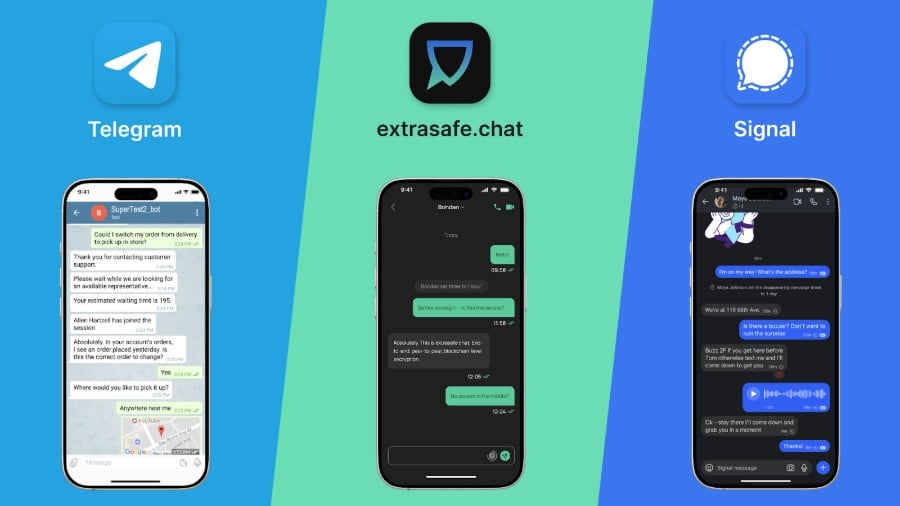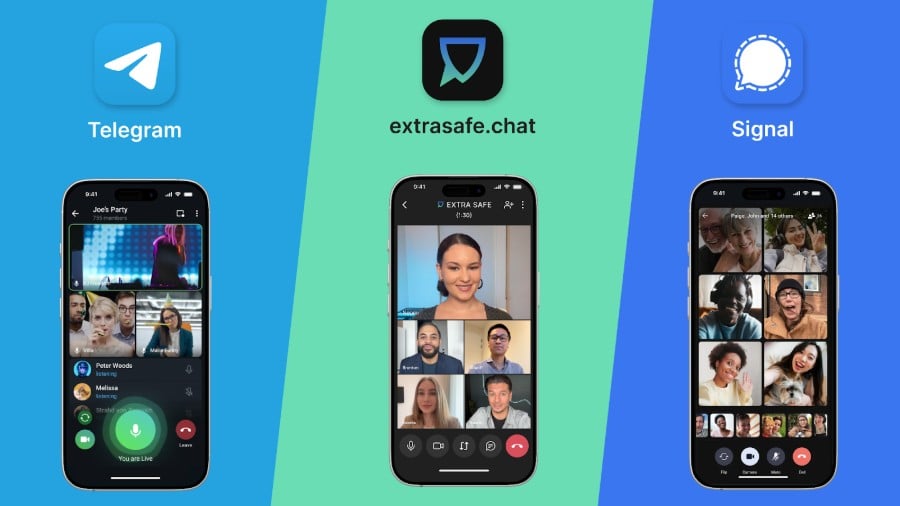Signal vs Telegram vs Extrasafe.chat: The Ultimate Web3 Messaging Showdown for 2025
Privacy wars escalate as Web3 users face their toughest choice yet—which messaging fortress truly protects digital assets.
Encryption Arms Race Heats Up
Signal's open-source protocol battles Telegram's massive Web3 communities while newcomer Extrasafe.chat promises blockchain-native security. Each platform stakes its claim on privacy—but which actually delivers when crypto fortunes are on the line?
Feature Breakdown: Security vs Convenience
Signal's end-to-end encryption remains the gold standard, though its Web3 integration lags. Telegram's bot ecosystem and channel features dominate crypto communications—despite lingering security concerns. Extrasafe.chat's decentralized architecture appeals to hardcore crypto natives, but faces adoption hurdles.
The Verdict: No Perfect Solution
Choose Signal for pure privacy, Telegram for community reach, or Extrasafe.chat for ideological alignment. Just remember—in crypto, your keys are only as safe as your weakest messaging habit. After all, what's another security layer when your portfolio's already down 60%?

Imagine messaging without handing over your phone number, email, or any other personal data. That’s the promise of privacy-first communication in the Web3 era: tools that keep you reachable, encrypted, and anonymous, without relying on identity gatekeepers.
And the demand is real. By early 2025, there were more than 659 million crypto owners worldwide, about 12% of all internet users, with 2 million wallets connecting daily to dApps and 34.4 million people using mobile wallets each month. Even MetaMask alone counts 30 million monthly active users. As wallets become the gateway to finance, identity, and coordination, it’s only natural that messaging should follow the same principles of self-custody and anonymity.
But the landscape of messengers is fragmented: some prioritize convenience, others focus on encryption, and very few are designed with privacy in mind. The Signal vs Telegram debate has dominated crypto communities for years — each has strengths, but both carry trade-offs. And now, a new category of messaging apps is emerging to push the conversation forward.
Why Messaging Matters in Web3
Crypto users coordinate more than memes and price speculation. They manage DAOs, negotiate token launches, vote on governance proposals, and handle sensitive information that can move markets. In that sense, messaging has become a LAYER of the crypto stack, alongside wallets and exchanges.
In that sense, messaging has become a layer of the crypto stack, alongside wallets and exchanges.
The problem? Most mainstream apps were designed with Web2 assumptions: centralized servers, metadata collection, and accounts tied to real-world identifiers. Beyond structural issues, the real-world risks for crypto users are even higher. Research shows that over 60% of traders targeted on Telegram have lost funds to fraud, while large-scale studies found 28% of shared links on the platform were phishing attempts and 38% of shared files carried malware. With pig-butchering scams alone accounting for a third of all crypto scam revenue and growing by 40% year over year, relying on traditional messengers is more than just inconvenient — it’s dangerous.
Web3 users need something more than just “private messaging.” They need tools that:
- Preserve anonymity — no identity indicator is linked.
- Direct P2P connection — conversations flow device-to-device, not through central servers. Encryption keys are created and stored locally on your device, never handed to a third party.
- Disappearing by design — unlike blockchains, where data is permanent and public, private communication requires the opposite: temporary storage with auto-erase timers, ensuring sensitive chats vanish completely.
- Enable trustless collaboration — tools that work like wallets, not Web2 logins.
Leaking token launch plans, private deal terms, or account credentials in the wrong chat can lead to front-running, market manipulation, or targeted attacks. That’s why secure, Web3-aligned messaging is more than convenience — it’s survival.
Web3 Messaging Evaluation Criteria: Telegram vs Signal
The Telegram vs Signal comparison is one of the most common privacy debates in crypto circles. When comparing messaging apps through a Web3 lens, it’s important to evaluate them against criteria that go beyond basic encryption. Four key aspects matter most:
With those benchmarks in mind, here’s how Telegram, Signal, and extrasafe.chat compare.
Telegram
Telegram has become the de facto hub for crypto communities, with massive groups, channels, bots, and an intuitive UX. According to a 2024 CoinGecko survey, 21.5% of crypto community members said they spend most of their time on Telegram for crypto-related activity — placing it just behind Twitter (X). The difference is in how each platform is used: Twitter (X) dominates for broad communication through posts, comments, and Spaces, while Telegram has become the go-to for community groups, personal chats, and dedicated project channels. That flexibility is powerful for coordination, broadcasting updates, and onboarding new users at scale. Its accessibility and multi-device sync make it the most widely adopted messenger in the Web3 world.
- Identity & Reachability: Requires a phone number to sign up, with optional usernames. Phone numbers may be hidden, but they’re still on Telegram’s database.
- Key Generation & Custody: In Secret Chats, encryption keys are stored only on the device, with sessions periodically re-keyed for forward secrecy. Default cloud chats, however, rely on server-side storage and aren’t end-to-end encrypted.
- Data Retention: Cloud chats persist indefinitely unless manually deleted. Secret Chats, however, are device-specific and can be configured to self-destruct.
- Real-Time Media Security: Voice and video calls are encrypted, using SRTP + DTLS. Telegram uses peer-to-peer connections for voice and video calls whenever possible. If P2P fails (due to network restrictions or NAT issues), calls are routed through Telegram’s distributed servers, chosen for minimal latency. It’s noteworthy that exact P2P success rates aren’t publicly disclosed, but Telegram emphasizes that P2P is used “whenever possible.” Relays serve only as a fallback for connectivity.
Telegram’s strength lies in its scale and flexibility, making it invaluable for community building and coordination. However, for high-stakes conversations that demand strict anonymity and zero data persistence, users may need to look for a Telegram alternative with a focus on privacy.
Signal
Signal remains a Gold standard of encrypted messaging, endorsed by Edward Snowden and used by activists, governments, and military forces worldwide. It’s widely used among Web3 users who value privacy and strong encryption, though its reliance on phone numbers means it isn’t always ideal for those seeking full anonymity.
- Identity & Reachability: Requires a phone number to register. Usernames help, but onboarding is still tied to real-world identity.
- Key Generation & Custody: Keys are generated and stored locally on the device, ensuring forward secrecy and full user control.
- Data Retention: Supports disappearing messages;
- Real-Time Media Security: Messages and calls are protected with the Signal Protocol (AES-256, Curve25519, Double Ratchet). Voice and video calls use WebRTC with end-to-end encryption; audio/video quality is strong, though scalability is limited compared to Telegram.
Signal is one of the most secure everyday messengers, trusted for its strong encryption and open-source foundation. Still, users who require full anonymity and contact without personal info may find themselves looking for a Signal alternative without a phone number, built with Web3 principles in mind.
extrasafe.chat: A Messaging App for Private Communication
This is where extrasafe.chat steps in. It’s not another clone of Telegram or Signal, but a chat app that applies the blockchain security model to calls and messages, taking privacy to the next level. Just like crypto wallets, it generates keys locally, keeps them in self-custody, and gives users full control.
- Identity & Reachability: On first use, the app creates an Ethereum-style account (a public/private keypair) directly on your device, used to prove it’s really you whenever you place a call or send a message. You also get an EXTRA SAFE number — a random 9-digit identity that isn’t tied to personal details. Voice and video streams connect device-to-device (P2P) for full privacy.
- Key Generation & Custody: Encryption keys are created locally and never leave your device, reflecting the same self-custody principle that powers crypto wallets.
- Data Retention: Conversations are designed to vanish. Built-in timers and auto-clearing sessions ensure messages are erased instead of stored.
- Real-Time Media Security: Audio and video streams are protected natively by WebRTC (it utilizes SRTP and DLTS protocols to ensure that packages are trustworthy and prevent unauthorized parties from understanding the content, even if they intercept it) and connect peer-to-peer by default. Messages, files, and contacts are end-to-end encrypted with AES-256-GCM algorithm.
Why are people choosing EXTRA SAFE
Each install is a decision to communicate with real privacy and security:
- Anonymity as privacy. Your conversations are never tied to personal identity.
- Ethereum encryption with peer-to-peer. Every call and message travels directly between devices, protected by the strongest encryption standard available.
- Messages that vanish. Share sensitive details—like a password for your team—knowing they disappear without leaving digital traces.
- Effortless private meetings. Start a video meeting and let anyone join, even without the app. The browser version makes EXTRA SAFE a secure alternative to Zoom or Google Meet.
Think of it as a Telegram and Signal alternative rolled into an app — designed for users who refuse to trade with their personal data. It prioritizes anonymity and ephemerality above all else — ideal for sensitive coordination, but less suited for casual group chats or mass communication.
Telegram vs Signal vs extrasafe.chat: Side-by-Side Comparison & Key Takeaways

To make these differences clear, we’ve broken down Telegram, Signal, and extrasafe.chat against the same evaluation criteria: identity & reachability, key generation & custody, data retention, and real-time media security. The table below shows how each app approaches privacy and where its trade-offs lie.
| Criteria | Telegram | Signal | extrasafe.chat |
| Identity | Phone number required
Username optional. |
Phone number required
Usernames available. |
Nickname, optional, no relation to private data (no email, no phone) |
| Key Generation & Custody | Secret Chats: keys on-device with re-keying. Cloud chats stored on servers, not E2EE. | Keys generated & stored locally; full user control. | Private keys generated and stored locally; never leave the device. |
| Data Retention | Cloud chats saved indefinitely. Secret Chats can self-destruct. | Supports disappearing messages. | All chats have timers or auto-clear. |
| Real-Time Media Security | Calls encrypted (SRTP+DTLS). P2P when possible; relays as fallback. | Messages/calls protected with Signal Protocol; secure voice/video, limited scalability. | P2P architecture. WebRTC (SRTP+DTLS) for audio/video. AES-256-GCM encryption for chat messages and files. |
Taken together, the Telegram vs Signal vs extrasafe.chat comparison shows how different approaches to privacy shape the way Web3 communities communicate. Telegram still dominates for reach and scale, Signal remains trusted for everyday encrypted chats, and extrasafe.chat pushes the boundaries with ephemeral, self-custody messaging. The evolution is clear: the future of communication in crypto is moving away from data control and phone numbers, and toward chat apps that treat identity and data the same way blockchains are.
extrasafe.chat is not a replacement for large communities (like Telegram groups/bots). It is purpose-built for private 1:1 or small-group conversations with anonymity and ephemeral storage.
Conclusion: Choosing the Right Messenger for Web3

So, what app is the best for Web3 messaging? That depends on what you value most: popularity and a lot of features or privacy and security.
From a security perspective, Signal and extrasafe.chat align most closely with the values of Web3 users. Signal is open source, has strong end-to-end encryption, and is widely trusted. extrasafe.chat takes a different route, using peer-to-peer calling and crypto anonymity.
The best choice depends on your needs. But whatever you use, make sure it protects more than just your messages. In the world of decentralized tech, your identity and data are just as important as your crypto. And as messaging apps evolve, users finally have options that align with decentralization, anonymity, and true digital sovereignty. For crypto holders, that alignment is critical: leaking a private key or governance vote in the wrong chat can be as costly as losing funds on-chain.

